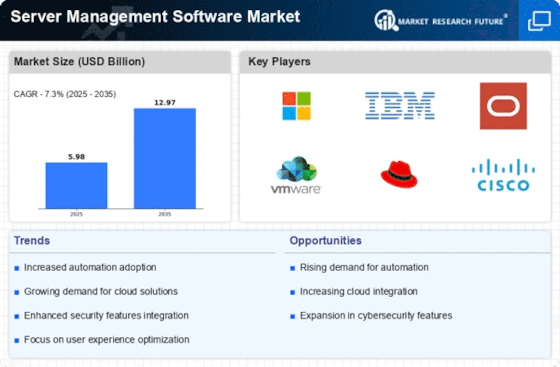Market Analysis
In-depth Analysis of Server Management Software Market Industry Landscape
The market dynamics of server management software are molded by shift in technological needs and also by the demand that is highly growing for effective and safe data management. The ever rising number of businesses being digitized has created opportunities for growth and change in the server management software market. Cloud technology is one of the major drivers which accelerates the growth of this market. The latest trend is that more and more companies are migrating their operations to the cloud; consequently, advanced server management tools have become required to be effective, secure and scalable.
Additionally, more complex IT infrastructures have dramatically raised the requirement for server management software with capabilities of automating and integrating multiple tasks. In a world where organizations work in dynamic conditions, server solutions are designed to respond quickly to changing business demands. This growth has engendered a rise in the take-up of server management systems that possess features such as real-time monitoring, predictive analytics and auto capabilities. These features not only ensure ease of use but also assure cost-effectiveness through the automatic operations and minimum downtime.
The popularity of servers in the market has been greatly enhanced by the prevalent security concerns. In tune with the widespread espousal of cyber dangers and data leaks, organizations are increasingly placing emphasis on formidable security measures for their servers. Hence, server management software vendors are including more sophisticated security components like threat detection, encryption, and access controls to make sure private data and integrity of server environment are maintained. Security has been a decisive factor when it comes to the distinction between different companies in this competitive market.
The interoperability and compatibility are the other noteworthy elements that determine the course of market developments. With the increasing use of a variety of apps and technologies in business, it is becoming a necessity that the server management software can be easily integrated into the pre-existing applications smoothly. Vendors are investing in developing tools that can easily integrate with several technologies across various platforms, which provides a holistic and integrated server management environment. This interoperability, therefore, not only saves on managerial process time but also prepares the infrastructures for the future.
The server management market is observing a transition towards more facilitative interfaces which are amazing and easy-to-use. Vendors are trying to enable organizations and reduce reliance on tailored skills by building software products with user-friendly interface and detailed documentation. This is true as it empowers even less technical users to efficiently manage and monitor the server environments, through a democratization of access to important server management functionalities.


















Leave a Comment